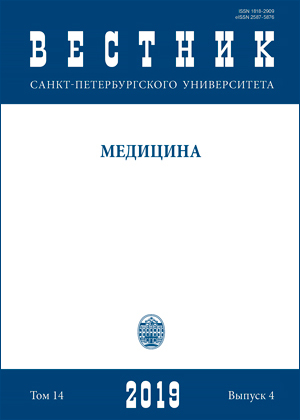Prolactin and autoimmunity in silicone mammoplasty*
DOI:
https://doi.org/10.21638/spbu11.2019.434Аннотация
The article is devoted to the study of the effect of silicone as an adjuvant on the development of autoimmune complications of mammoplasty and the development of autoimmune syndrome induced by adjuvants “ASIA”. This controlled cohort prospective non-randomized research is based on analysis of clinical observations of 121 patients undergoing plastic surgery on the mammary glands for aesthetic purposes, as well for reconstructive and oncological indications, both with and without silicone implants. To obtain preliminary results and evaluate the study, 27 blood serum samples were randomly selected, in which the dynamics of prolactin levels and autoantibody profiles towards 7 common autoantigens were studied before and after 3 and 6 months post-surgery. It was found that 5 out of 27 patients after mammoplasty showed an increase in 2 types of autoantibodies (against modified citrullinated vimentin and annexin V). Patient in need for mammoplasty have increased serum levels of prolactin at the day of operation. After surgery on the mammary gland, the level of prolactin decreases to normal range within 3 months, even if it was significantly higher than normal before surgery. Both of these facts require additional research and analysis on a wider cohorts of patients.
Ключевые слова:
plastic surgery, breast augmentation, breast reconstruction, silicone, autoimmune diseases, autoantibodies, adjuvant, autoimmune inflammatory syndrome induced by adjuvants (ASIA)
Скачивания
Библиографические ссылки
References
Загрузки
Опубликован
Как цитировать
Выпуск
Раздел
Лицензия
Статьи журнала «Вестник Санкт-Петербургского университета. Медицина» находятся в открытом доступе и распространяются в соответствии с условиями Лицензионного Договора с Санкт-Петербургским государственным университетом, который бесплатно предоставляет авторам неограниченное распространение и самостоятельное архивирование.




